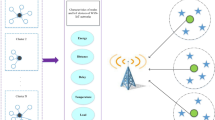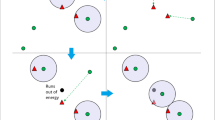Abstract
Power-aware routing in wireless ad hoc networks has been extensively explored in recent years, and various routing metrics were developed for the prolongation of network lifetime. This work studies power-aware routing so as to maximize the minimum remaining energy of all nodes after routing. This routing metric, referred to as Maximum-Residual Routing, aims at maintaining the minimum remaining energy as high as possible so as to delay the fist failure time of nodes in the network. In this paper, a polynomial-time optimal algorithm is proposed for Maximum-Residual Multicasting. We then show that Maximum-Residual Aggregating is \({\mathcal{NP}}\)-hard and that, unless \({\mathcal{P = NP}},\) its minimization version cannot be approximated within a ratio better than (2 − ε) for any ε > 0. The proposed routing algorithm for Maximum-Residual Multicasting can be applied to existing routing protocols, especially those based on the link-state approach. The capability of the algorithm was evaluated by a series of experiments, for which we have very encouraging results in network lifetime and load balance.






Similar content being viewed by others
References
Abolhasan, M., Wysocki, T. A., & Dutkiewicz, E. (2004). A review of routing protocols for mobile ad hoc networks. Ad Hoc Networks, 2, 1–22.
Ambühl, C. (2005). An optimal bound for the mst algorithm to compute energy efficient broadcast trees in wireless networks. In Proceedings of the ICALP (pp. 1139–1150).
Buragohain, C., Agrawal, D., & Suri, S. (2005). Power aware routing for sensor databases. In Proceedings of the IEEE INFOCOM (pp. 1747–1757).
Čagalj, M., Hubaux, J., & Enz, C. (2002). Minimum-energy broadcast in all-wireless networks: Np-completeness and distribution issues. In Proceedings of the ACM MobiCom (pp. 172–182).
Călinescu, G., Kapoor, S., Olshevsky, A., & Zelikovsky, A. (2003). Network lifetime and power assignment in ad-hoc wireless networks. In Proceedings of the ESA (pp. 114–126).
Caragiannis, I., Flammini, M., & Moscardelli, L. (2007). An exponential improvement on the mst heuristic for minimum energy broadcasting in ad hoc wireless networks. In Proceedings of the ICALP (pp. 447–458).
Chandrakasan, A., Heinzelman, W. R., & Balakrishnan, H. (2000). Energy-efficient communication protocol for wireless microsensor networks. In Proceedings of the IEEE HICSS (pp. 1–10).
Chang, J., & Tassiulas, L. (2004). Maximum lifetime routing in wireless sensor networks. IEEE/ACM Transactions on Networking, 12, 609–619.
Chang, J. H., & Tassiulas, L. (2000). Energy conserving routing in wireless ad-hoc networks. In Proceedings of the IEEE INFOCOM (pp. 22–31).
Clementi, A. E. F., Crescenzi, P., Penna, P., Rossi, G., & Vocca, P. (2001). On the complexity of computing minimum energy consumption broadcast subgraphs. In Proceedings of the STACS (pp. 121–131).
Cormen, T. H., Leiserson, C. E., Rivest, R. L., & Stein, C. (2001). Introduction to algorithms (2nd ed., pp. 561–579). The MIT Press.
Garcia-Luna-Aceves J. J., & Spohn, C. M. (1999). Source-tree routing in wireless networks. In Proceedings of the IEEE ICNP (pp. 273–282).
Garey, M. R., & Johnson, D. S. (1979). Computers and intractability: A guide to the theory of NP-completeness (pp. 199– 200, 208–209). Freeman Press.
Jacquet, P., Muhlethaler, P., Clausen, T., Laouiti, A., Qayyum, A., & Viennot, L. (2001). Optimized link state routing protocol for ad hoc networks. In Proceedings of the IEEE INMIC (pp. 62–68).
Kalpakis, K., Dasgupta, K., & Namjoshi, P. (2003). Efficient algorithms for maximum lifetime data gathering and aggregation in wireless sensor networks. Computer Networks. 42, 697–716.
Krishnamachari, B., Estrin, D., & Wicker, S. B. (2002). The impact of data aggregation in wireless sensor networks. In Proceedings of the DEBS (pp. 575–578).
Li, Q., Aslam, J., & Rus, D. (2001). Online power-aware routing in wireless ad hoc networks. In Proceedings of the ACM MobiCom (pp. 91–107).
Low, C. P., & Goh, L. W. (2005). On the construction of energyefficient maximum residual battery capacity broadcast trees in static ad hoc wireless networks. Computer Communications, 29, 93–102.
Orda, A., & Yassour, B. A. (2005). Maximum-lifetime routing algorithms for networks with omnidirectional and directional antennas. In Proceedings of the ACM MobiHoc (pp. 426–437).
Park, J., & Sahni, S. (2006). An online heuristic for maximum lifetime routing in wireless sensor networks. IEEE Transactions on Computers, 55, 1048–1056.
Sankar, A., & Liu, Z. (2004). Maximum lifetime routing in wireless ad-hoc networks. In Proceedings of the IEEE INFOCOM (pp. 1089–1097).
Singh, S., Raghavendra, C. S., & Stepanek, J. (1999). Power-aware broadcasting in mobile ad hoc networks. In Proceedings of the IEEE PIMRC (pp. 22–31).
Singh, S., Woo, M., & Raghavendra, C. S. (1998). Power-aware routing in mobile ad hoc networks. In Proceedings of the ACM MobiCom (pp. 181–190).
Toh, C. K. (2001). Maximum battery life routing to support ubiquitous mobile computing in wireless ad hoc networks. IEEE Communications Magazine, 39, 138–147.
Wan, P. J., Calinescu, G., Li, X. Y., & Frieder, O. (2002). Minimumenergy broadcast routing in static ad hoc wireless networks. ACM Wireless Networks, 8, 607–617.
Wieselthier, J. E., Nguyen, G. D., & Ephremides, A. (2000). On the construction of energy-efficient broadcast and multicast trees in wireless networks. In Proceedings of the IEEE INFOCOM (pp. 585–594).
Xie, Q., Lea, C. T., Golin, M. J., & Fleischer, R. (2003). Maximum residual energy routing with reverse energy cost. In Proceedings of the IEEE GlobeCom (pp. 564–569).
Yu, Y., Govindan, R. H., & Estrin, D. (2001). Geographical and energy-aware routing: A recursive data dissemination protocol for wireless sensor networks. Technical Report, UCLA Computer Science Department.
Author information
Authors and Affiliations
Corresponding author
Rights and permissions
About this article
Cite this article
Hsiu, PC., Wu, CH. & Kuo, TW. Maximum-residual multicasting and aggregating in wireless ad hoc networks. Wireless Netw 16, 701–711 (2010). https://doi.org/10.1007/s11276-009-0163-4
Published:
Issue Date:
DOI: https://doi.org/10.1007/s11276-009-0163-4




